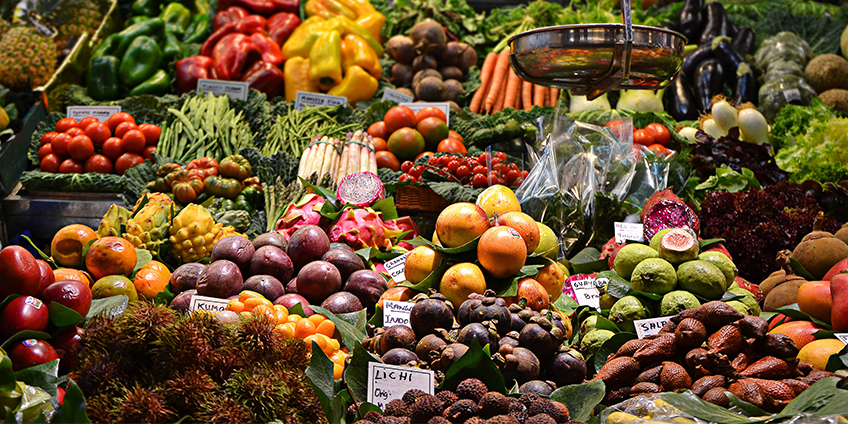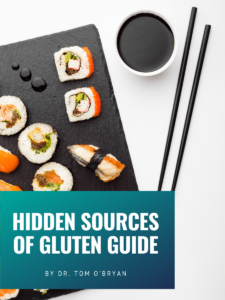I’m going to say something revolutionary here- Inflammation is not a bad thing. You’ve only heard of it in the negative context, but you need inflammation to help your immune system function. But, just like everything, too much is a bad thing. It is far far more common to have excess inflammation in the body rather than a lack of it. That excess is where the problems start.
Chronic inflammation is the source of autoimmune disease, and so much of the food we eat today is bound to cause constant inflammation. Finding solutions for combating it with anti-inflammatory foods and supplements is necessary to help control that inflammation. If you control that then you can avoid the third highest cause of death — autoimmunity.
So why food? We’re told to address inflammation with medication. You get heartburn, you pop an antacid, problem solved. But what we don’t realize is that food is medicine. It needs to be a bigger thought than just the in the moment issue.
What if you never had to have heartburn in the first place because you didn’t have GERD from a leaky gut? What if you didn’t have to suffer with autoimmune?
That’s possible if you’re eating the right foods.
There are two types of foods you can eat: inflammatory or anti-inflammatory. If you are already on the autoimmune spectrum, one of your main priorities should be making this shift. Your body has inflammation, and it’s on fire.
This list is going to help you, because it’s not going to be a list of foods you can’t eat, or supplements that are hard to find (But if you need some easy ones to get, check out my store!). This list is going to be foods you probably eat all the time, or things you can pick up right at your local supermarket. Foods that will be seamlessly woven into your life, and make it all the better once they’re there.
So here are the basics.
Berries- I love berries, because I feel like they’re the ultimate food. They’re portable, they’re easy to prep, kids love them, and they go with pretty much everything. Strawberries, blueberries, cherries, blackberries, raspberries, whatever. Pick your favorite and go.
As always you should strive for organic, and the best way to do that is to go for what is currently in season. Make it a game with your kids if you want. Have them go into the produce aisle with you and find the berries they like best. If you have picky eaters (or if you’re a picky eater yourself) you can also buy them frozen. Frozen berries are great in a smoothie!
Nuts – Another super simple one. Nuts can be integrated into so many recipes- if you need some stick around to the end of this blog! Nuts are great because they are beneficial for inflammation, but also so much more. Walnuts are high in omega-3s which help your brain, almonds help to lower your cholesterol, brazil nuts are one of the only vegan non-inflammatory foods high in selenium. You can make your own trail mix with your favorite nuts and grab a handful whenever you need a snack, and it’s a great way to cut down the inflammation in your body.
Garlic – Garlic is also a great anti-inflammatory food. Garlic is part of my protocol. I can proudly say that I have a 100% success rate. My patients that have done my protocol and then gone to India or Africa or Mexico don’t get Montezuma’s revenge. They’ll say, “Doc, everyone on the tour got really sick and had diarrhea but we didn’t get sick.”. The best part about this is that garlic is tasty. We love to put garlic in recipes, and now you know that doing so is also helping your body.
Fermented Foods – Break out the kombucha and pickles! But in all seriousness, fermented foods are amazing in so many ways. They’re anti-fungal, anti-oxidant, anti-microbial, and, most importantly, anti-inflammatory. Fermented food isn’t to everyone’s taste, but I always encourage giving things a second try if they weren’t your favorite. You can even make your own pickled veggies and fermented foods if you prefer. The recipe book I’ve included at the end of this has some amazing fermented recipes.
Water – Okay, admittedly, water isn’t a food, but it is essential. Drink a half ounce of water per pound body weight as a bare minimum. This is not negotiable. If you want your body to work right, you have to give it enough fuel. Think of the river that carries nutrients: your bloodstream and your lymphatic system. You have to have enough liquid to carry everything. Coca Cola doesn’t do it. Orange juice doesn’t do it. Coffee doesn’t do it. The only thing that your body doesn’t have to address and digest to make more alkaline is water. Water is neutral, and it gets in through osmosis. Everything else has to be addressed.
The first thing you should do when you wake up in the morning is drink two big glasses of water, immediately. You’ll feel full for a minute or two. But, within a couple of days, you look forward to it. It just changes your day when you hydrate immediately.
Peppers – Those who love heat are going to love to hear this, but even those of us who aren’t fans of spicy foods can enjoy peppers. Bell peppers are loaded with quercetin, a powerful antioxidant that is known to help with all kinds of chronic conditions including diabetes. Lots of types of peppers have capsaicin in them, and capsaicin has great anti-inflammatory properties. Peppers are great in lots of dishes, but you can even just slice some up and have them as a snack with some hummus.
Fatty Fish – All types of fish contain omega-3 fatty acids, but fatty fish are the best. Fish like salmon, mackerel, anchovies, or sardines. The thing that is tricky with fatty fish is that so much of the fish in the grocery stores is not up to par. A lot of the salmon you find on the market is farm fish, and the health benefits of eating it are next to nothing. You need to find fish that are wild-caught, and my suggestion for that is always Vital Choice. Not only are they committed to ethically sourcing the best fish possible, they also deliver right to your door.
Applesauce – The Pectin in applesauce increases the level of a powerful anti-inflammatory in your gut called intestinal alkaline phosphatase. It helps burn fat, too. But, unlike the other things on this list, don’t buy the commercial stuff. You have to make it fresh for it to be beneficial, because the stuff in the grocery stores is loaded with sugar, and preservatives, and all kinds of things that take away all the health benefits.
I would have two to four tablespoons a day. Remember, base hits win the ballgame. Have the kids help you make the apple sauce. You can throw some raisins in there so they like the sweetness of it.
Now that I’ve given you all these foods, have some recipes! This is a link to my autoimmune fix recipe book. It has a ton of recipes in it for Breakfast, Lunch, Dinner, and More. Use it and your new knowledge on anti-inflammatory foods to help heal yourself and your family.
Remember! The foods you feed your family fall within those two categories of either inflammatory or anti-inflammatory. As parents, we can do for our kids what we didn’t get to do for ourselves. They don’t have to suffer the way we have. When you create those family meals or shop at the grocery store, use them as your motivation to improve your own habits. Teach them how you can enjoy anti-inflammatory foods and see how their love for these new foods changes your own health journey.
Many people address inflammation with medication, but what they don’t realize is that food is medicine. There are two types of foods you can eat: inflammatory or anti-inflammatory. If you are already on the autoimmune spectrum, one of your main priorities should be stifling those fires. Your body has inflammation. So eat up!
There are a number of different anti-inflammatory nutritional things that you can do.
Here are some of the basics that really win the ballgame.
Vitamin C – One of my favorite products is called Vitality C. It’s a powdered vitamin C. I take a scoop every morning. Vitality C is put together in a way that has four different pathways by which this type of vitamin C can be absorbed into your cells.
Vitamin C is an antioxidant and anti-inflammatory. I like the powdered vitamin C. So I’ll take a scoop in the morning with one of my glasses of water and then I’ll take another scoop later. Each scoop is about 4,000 milligrams. I’ll do another scoop when I have a smoothie later in the morning or early afternoon. I’ll get a couple of scoops a day of Vitality C. So many people need more vitamin C.
You’ll know you’ve taken too much vitamin C if you get loose bowels or diarrhea. It’s extremely safe for you and most people can take a lot more than what they’re currently taking.
Colostrum – Colostrum is nature’s way of turning the genes on that are anti-inflammatory and turning the genes off that are inflammatory. It turns on the genes that heal the gut, close leaky gut, and close leaky brain. If you’ve not heard me talk about leaky brain, read my book You Can Fix Your Brain — it’s just as prevalent as leaky gut.
There are many different products that are really good anti-inflammatories. Many individual products work really well, but only colostrum plays the entire symphony. It turns on more genes than anything else. So, if there’s one thing I was going to take, it would be GS Immuno Restore Powder. I just put it in my smoothie. Whatever I can find, I throw into my smoothies and really pack it with as many nutrients as I can.
Now, for those that have an autoimmune disease or have noticeable inflammation in their gut with gut symptoms, there’s a more concentrated form of colostrum called GS Immuno PRP Pro. Start with GS Immuno PRP Pro for a couple of months. Then transition over to GS Immuno Restore Powder. GS Immuno PRP Pro is a powdered colostrum with a higher dosing of IgG immunoglobulins, containing 10,000 milligrams of IgG immunoglobulins in every serving. It’s like you’re bringing in an extra squad of special forces, IgG immunoglobulins, to help deal with the inflammation in the gut.
The next from colostrum is GS Immuno Restore PRP Spray. In the spray, they’ve taken the immunoglobulins and some of the peptides of colostrum that help to heal the gut and heal the blood-brain barrier and put them in a spray bottle. If you have brain issues going on of any type, I would use the GS Immuno Restore PRP Spray. Do a couple of squirts three times a day of it; it turns on the genes to close the blood-brain barrier from leaky brain and also turns on the genes to reduce inflammation in the brain. A good complimentary product to use with GS Immuno Restore PRP Spray would be Fog Cutter.
Fog Cutter is a combination of adaptogenic herbs that are renowned for helping with brain function and to turn on the genes for anti-inflammation and off for inflammation. The components in Fog Cutter have been shown to increase brain derived neurotrophic factor (BDNF).
Curcumin – The one ingredient that everyone should be using is curcumin. Curcumin comes from herbs like turmeric. I cook with turmeric regularly — even a little is great for you. Spices in general are great for you. Everyone should have a little window sill garden of a couple of spices that are growing like basil and thyme. It’s a little harder to grow tumeric. Spices are great anti-inflammatory foods. They work really well for that.
Garlic – Garlic is also a great anti-inflammatory food. Garlic is part of my protocol. I can proudly say that I have a 100% success rate. My patients that have done my protocol and then gone to India or Africa or Mexico don’t get Montezuma’s revenge. They’ll say, “Doc, everyone on the tour got really sick and had diarrhea but we didn’t get sick.” That’s because they follow our protocols for that. One of the ingredients in the protocol is garlic. It’s a product called Kyolic. That’s not on our website, but you can get it in any health food store. Kyolic is great as an anti-inflammatory for your body.
Cloves – Cloves have the highest polyphenol level of any food. You can use it and make some tea. It’s a very powerful anti-inflammatory food.
GS CurcuEase – There are so many studies on the many pathways that turmeric or curcumin, the active ingredient in turmeric, beneficially affect. There are over 300 pathways. It’s very cool when you see the graphs that are done of all the different ways that curcumin can help you. Anyone that has systemic inflammation in their bodies should be taking GS CurcuEase or be using turmeric in their food quite regularly.
GS Support Packs– I put GS Support Packs together to deal specifically with leaky gut or intestinal permeability. There are many different nutrients that help reduce inflammation and heal the gut.
I put together the GS Support Packs with 22 different nutrients, all anti-inflammatory. They’re designed to take one pack per day. For all of our celiac patients, we give them GS Support Packs and the GS Immuno Restore Powder. Every patient gets that because that combination works really well to heal the gut. Everyone can do great with GS Support Packs. There are six pills in them, but it’s one pack a day because nobody’s going to open 22 bottles a day or six bottles every day. We’ve been doing that now for a number of years, and doctors all over the world are using them with great results.
E3 Advanced Plus – If you have been identified with a sensitivity to wheat, you should take E3 Advanced Plus before you eat in case of possible contamination. A study came out in the Journal of Gastroenterology. They looked at over 5,600 different foods on gluten free menus in restaurants and they went into the restaurant with their testing equipment. And what did they find? 32% of everything labeled gluten free was not gluten free. 54% of the gluten free pizzas were not gluten free. 52% of the gluten free pastas were not gluten free. They were contaminated with wheat. So, what do you do?
You just take one or two and you walk in and you pop them down with some water.
(And for kids) GS Immuno Greens – Now, these green powders are great as anti-inflammatories — and they come in different flavors! There’s a berry flavor, a chocolate flavor, and an espresso flavor. They’re all gluten free, and they’re very high in ORAC value. ORAC means oxygen radical absorbance capacity. What that means is that it sucks up a lot of the inflammation in your body.
The best thing would be to eat berries every day. Blueberries are a great anti-inflammatory food. You can eat blueberries, blackberries and raspberries — not so much strawberries. They don’t have the kind of polyphenols that quench the fire and put the fire out. Eat one cup of blueberries a day everyday for three years and you’ll be thinking as well or better than you did 13 years ago. It reverses cognitive decline of up to 13 years within three years of doing a cup a day.
But if you’re not going to eat berries every day, then have GS Immuno Greens. GS Immuno Greens are good because of the polyphenols that reduce inflammation in the brain. It tastes really good just in water, and kids like it a lot. I put it in my smoothie, and it’s another thing I just throw in there with the blueberries. You have to try the chocolate one.
Vitamin D3 + K2 – Vitamin D is a very strong anti-inflammatory. The product is called GS Vitamin D3 + K2. People ask, “Why the K2?” The vitamin K helps the vitamin D build stronger bones. The vitamin D is anti-inflammatory, and it helps with your bones. Vitamin K increases vitamin D’s effectiveness of building strong bone and building strong blood vessels.





